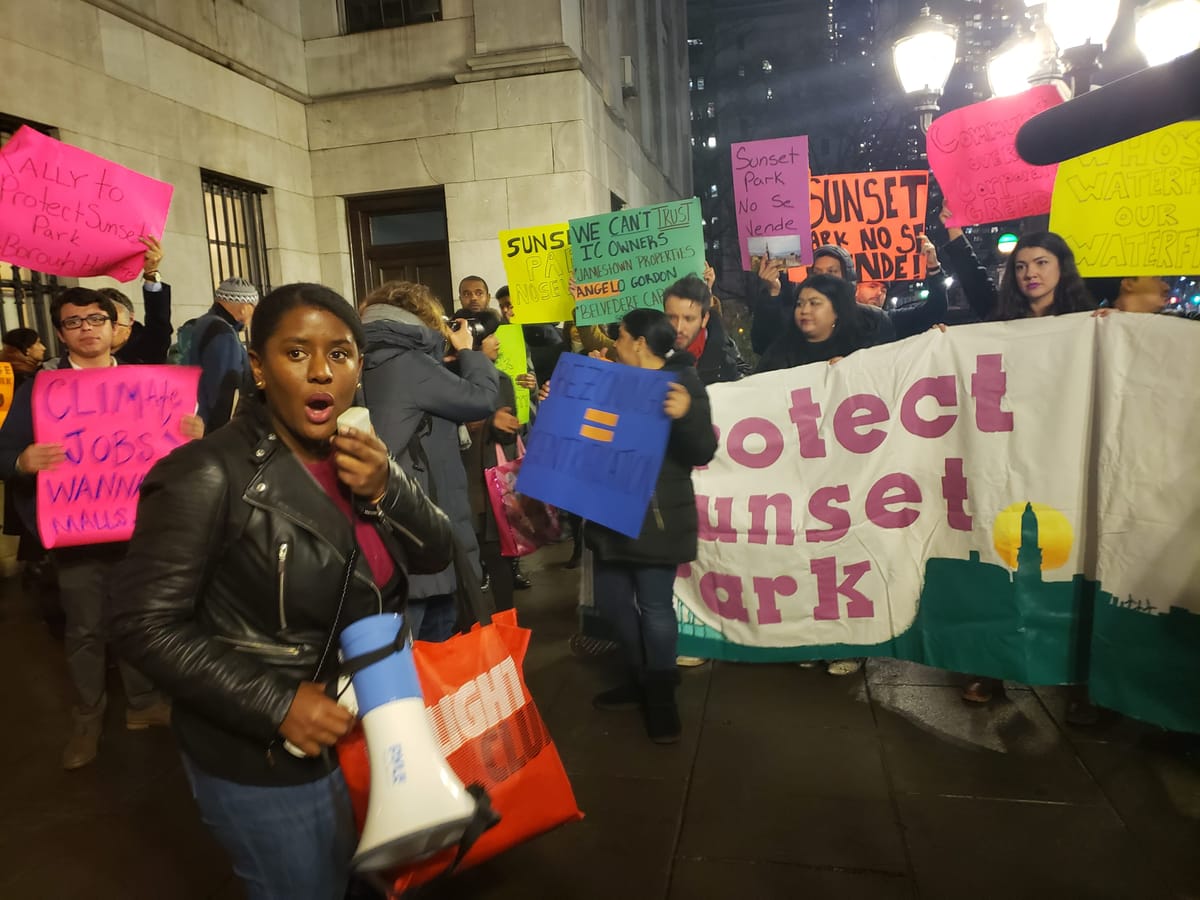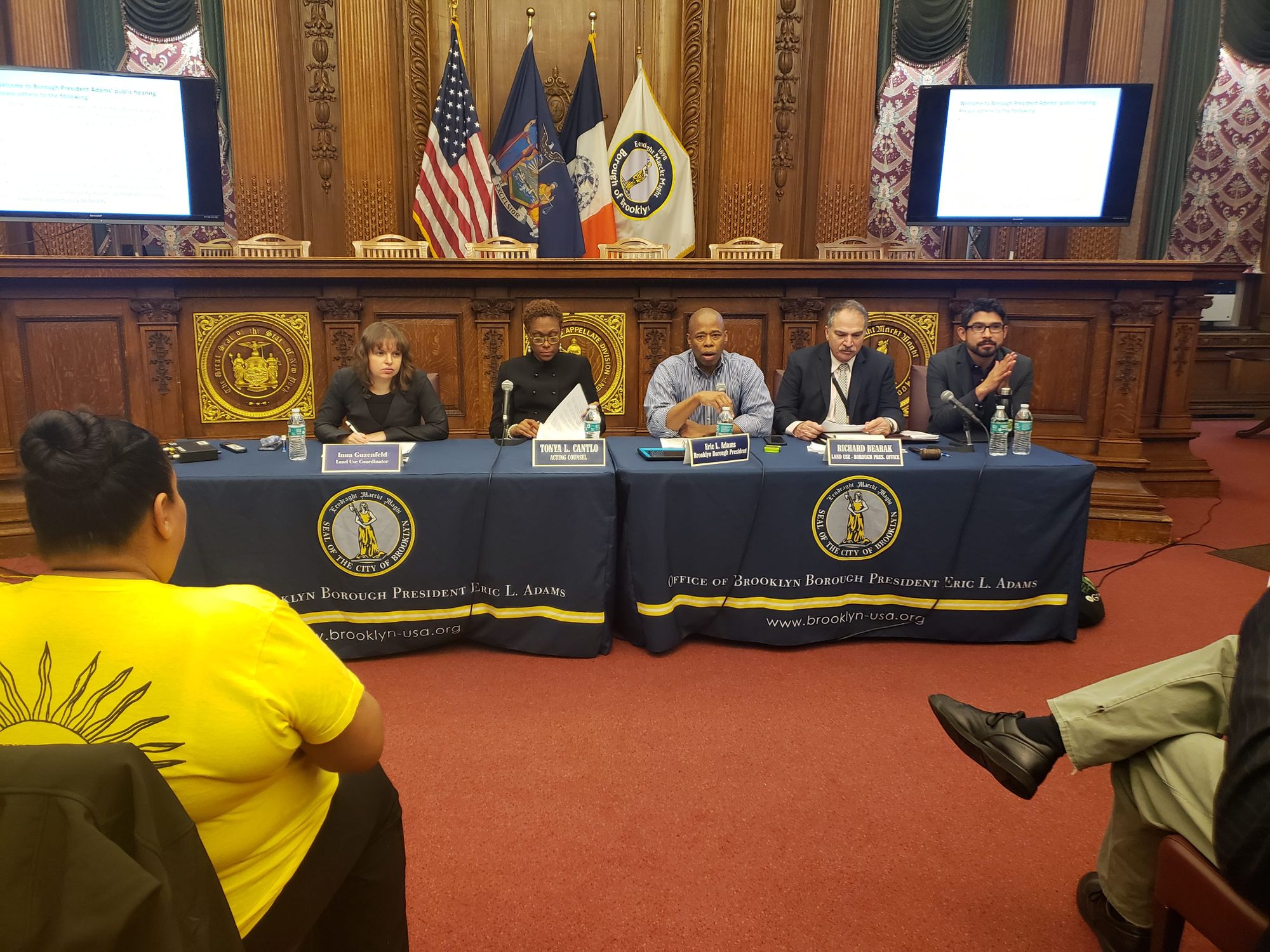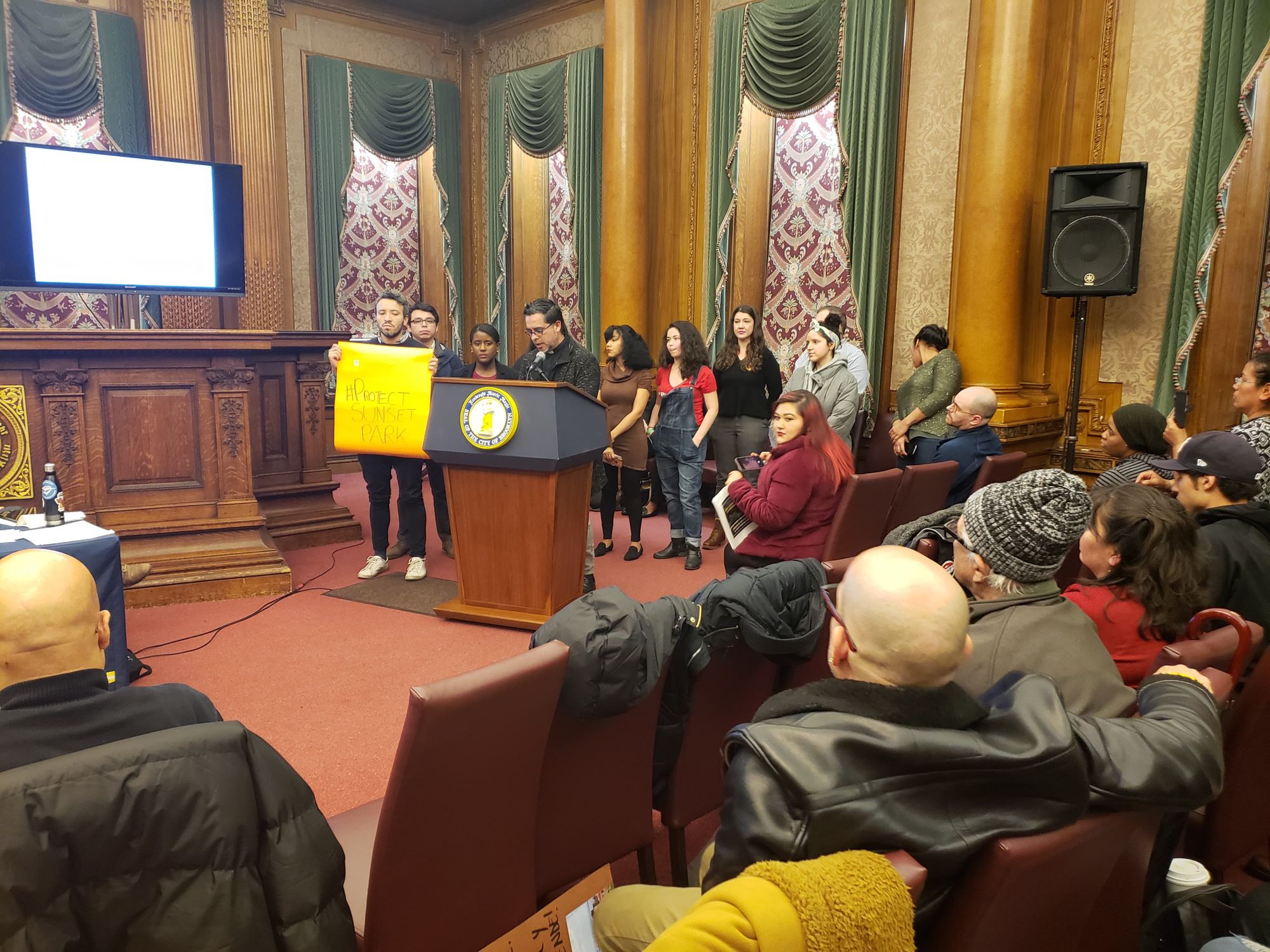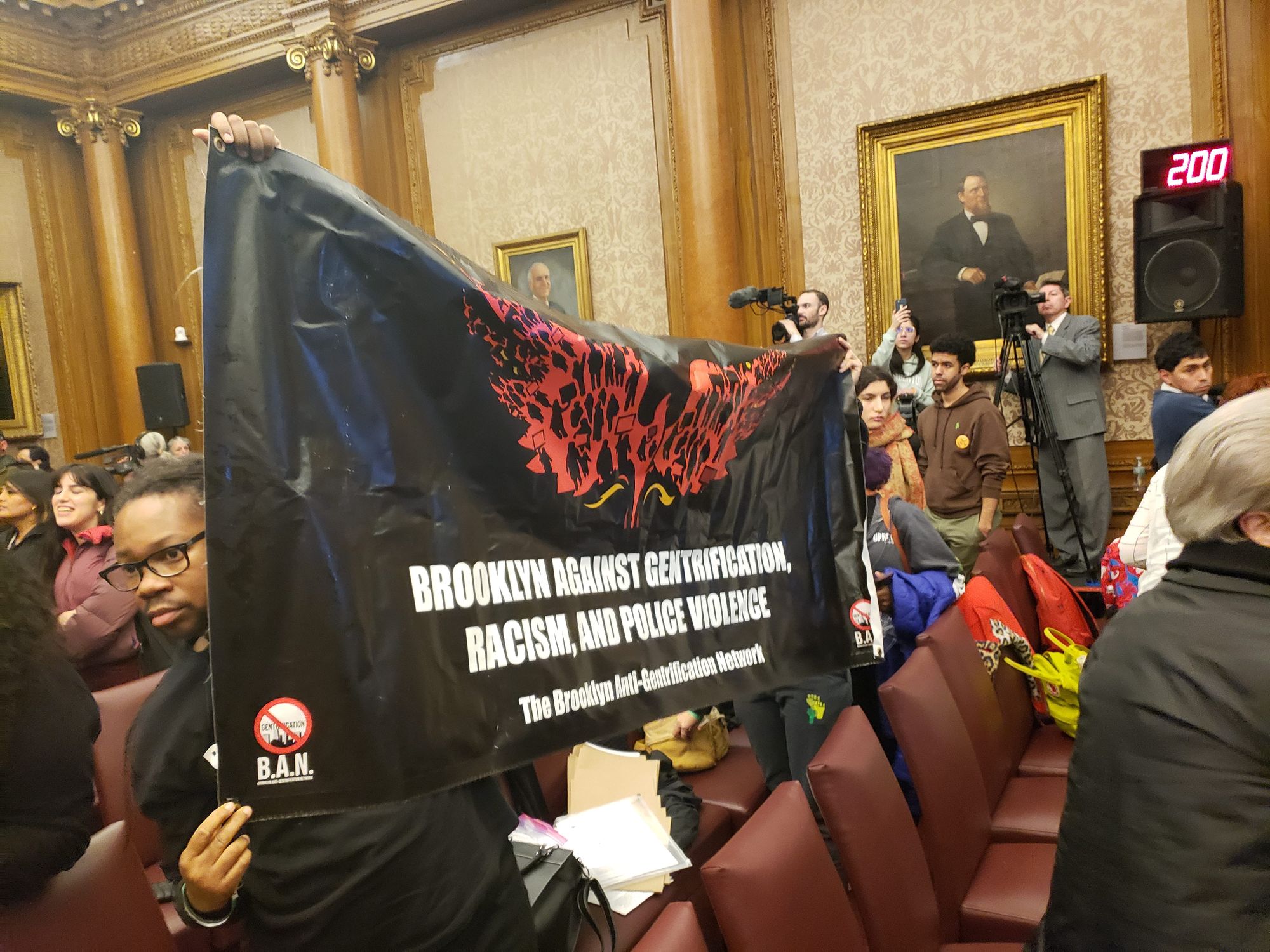Activists Shut Down Brooklyn Borough President’s Hearing on Industry City Rezoning


SUNSET PARK — Eric Adams, the Brooklyn Borough President, prematurely ended a hearing about Industry City’s rezoning request on Tuesday night at Borough Hall after multiple interruptions by activists.
Industry City is a massive commercial and industrial complex on the Brooklyn waterfront in Sunset Park owned by Jamestown, Belvedere Capital, Cammeby’s International and Angelo, Gordon & Co. If granted, the new zoning designation would allow Industry City to add another 1.46 million square feet of mixed use space: the proposed project would bring parking garages, new retail, and educational space. Industry City has already promised to remove two hotels from the original proposal and introduce a community benefits agreement as part of their negotiations with Councilmember Carlos Manchaca. They are promising 20,000 new jobs and $1 billion in private investments if their bid is successful.
Andrew Kimball, the CEO of Industry City, said at the meeting he wants to transform the campus into a hub for “the innovation economy,” a term that signifies a shift towards tech and commercial uses instead of manufacturing and shipping.
Housing rights advocates, environmental activists and concerned neighbors at the hearing voiced their concerns that the rezoning would lead to gentrification and displacement.
Joe Gonzalez, a concerned Brooklynite, says he was displaced from Fort Greene by gentrification.
“Every single rezoning pushes Latinos and Blacks out of the neighborhood,” said Gonzalez. “It’s the same rat pack of figures… BAM, Downtown Brooklyn Partnership, Andrew Kimball sitting in the back, who helped push me out of Fort Greene. These are not your friends if you are poor or working class people — if you’re living in neighborhoods of color in New York City.”
Jumaane Williams, the New York City Public Advocate, sent a surrogate to read his testimony opposing the rezoning. He emphasized that zoning changes need to prioritize people over profit.

“Any rezonings must be done with community needs in mind and in full consultation with that community,” said Williams.
Industry City drew the ire of Councilmember Menchaca when they first submitted the rezoning request. Councilmember Menchaca joined a chorus of housing advocates in accusing Industry City of attempting to rush the process without community feedback.
In December, Public Advocate Williams called for the city to conduct racial impact studies on all rezonings. In his testimony last night, he said Industry City’s proposal is an example of why these studies are necessary.
He also questioned Industry City’s climate considerations — a topic that is increasingly relevant to developers due to the recently passed Climate Mobilization Act and Climate Leadership and Community Protection Act.
“The environmental impact of this action will be severe,” said Williams. “The proposal as it stands lacks adequate climate adaptation or mitigation and threatens to exacerbate issues of gentrification, loss of social cohesion, and climate vulnerability.”
Lourdes Perez, the Programs Coordinator at UPROSE, a Brooklyn-based Latino advocacy organization, said she’s also worried about climate impact and climate-disaster readiness in Sunset Park. She pointed to UPROSE’s counter-proposal for Industry City, the Green Resilient Industrial District (GRID), as an acceptable alternative to Industry City’s current plans for expansion.
“We can assume that the majority of the jobs that they’re going to be creating are service jobs, and service jobs are not living wage jobs,” said Perez. “Climate jobs are the jobs of the future, and they are living wage. They can serve the needs of the existing community.”

Jessica Ortiz, a member of the 32BJ Service Employees International Union, spoke in favor of the rezoning and the service jobs that could come with it.
“New investment in the Industry City site will provide an opportunity to lift up the current building service workers 32BJ represents, many of whom live and support families in the Sunset Park community,” said Ortiz. “Additionally the redevelopment of the Industry City site will generate hundreds of new building service jobs. We are pleased that the owners of industry city have made a commitment to pay a prevailing wage. These jobs could be life changing for members of the Sunset Park community.”
A prevailing wage is an industry standard, often set forth by a union. It’s not guaranteed to be a living wage, but is generally well above minimum wage and often comes with benefits. Whether or not that constitutes a living wage would depend on the cost of living.
Marcela Mitaynes, a veteran housing advocate and candidate for Assembly District 51 that represents Sunset Park, called for solidarity from the union members who support the rezoning.
“To the union members that are here to testify, we are not here to fight you,” said Mitaynes. “We should be standing together as working class people against this development. A job is only as good as the home you can afford.”
CEO Andrew Kimball has been conspicuously absent at prior events discussing the rezoning, but this time he showed up in person to defend his plans for expansion.
“We are at a fork in the road. Will our city’s leaders support this kind of private sector economic development with practical adjustments to outdated rezoning?” said Kimball. “With your support for this plan, we can ensure the benefits of redevelopment stay close to home.”

As Kimball asked this hypothetical question, he was drowned out by shouts of “no” from the audience — the first of three interruptions that eventually led to the meeting’s premature end.
Regina Myer, the President of Downtown Brooklyn Partnership, argued that the changes in Sunset Park are for the better.
“A historic decline in investment in Industry City mirrored the city-wide collapse of traditional manufacturing,” said Myer. “It’s revitalization in the past six years with new companies including beverage production, architecture design, and product fabrication have all helped Brooklyn in returning to a strong position in New York’s economy. We should be doing everything we can to further this transformation.”
Over an hour before the hearing was supposed to conclude, a third wave of chanting led Borough President Adams to close the meeting.
As Borough Hall staff worked to empty the room, protesters and activists unfurled banners, raised signs and chanted slogans. The chanting continued in the Borough Hall lobby, and, after the protesters were ejected from the lobby, on Borough Hall’s front steps.
“For the second time in this process, to prevent a heated situation from reaching the level of dangerous, an elected official wanting to hear from the public was forced to adjourn a meeting before everyone could be heard,” said Andrew Kimball, the CEO of Industry City, in a press release. “It is unfortunate that some agitators would prevent civil discourse simply because they are unwilling to let fact-based information be shared.”
While disruptive, the protesters were not dangerous or violent. The meeting was adjourned because Borough President Adams would not tolerate interruptions, not because anyone was in danger.
CB7 is expected to vote tonight, Wednesday, January 15, 2020 at 6:30 PM
4201 4th Avenue (entrance on 43rd Street)



